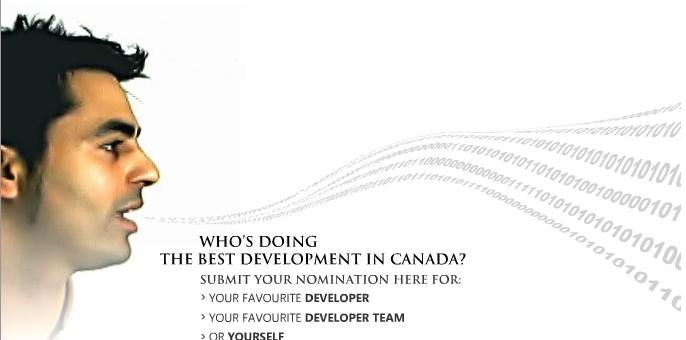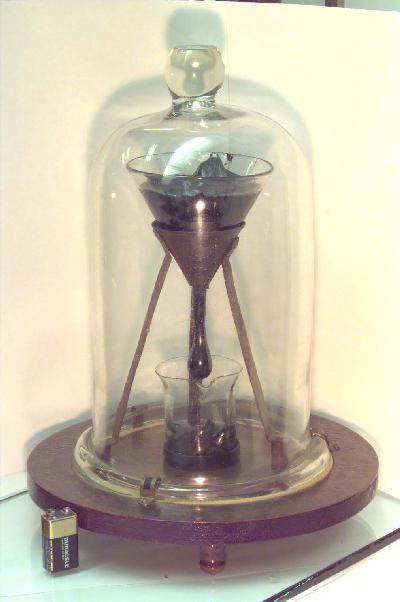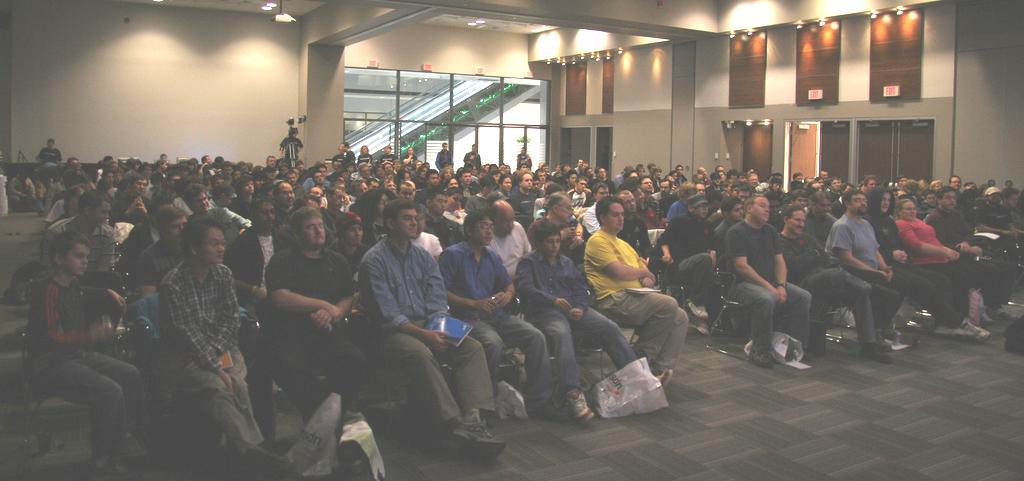 Friday, 17 November 2006

Microsoft Canada is running a contest. Nominate a developer (or team of developers) who is making software that makes a difference. Subscribe to the MSDN Flash (you should anyway) to make yourself an eligible nominator. Like the nomination form says:
Judges are seeking nominations that present an innovative solution that
- defines how Microsoft technology (e.g. Visual Studio® development system, Microsoft® SQL Server™ 2005, Windows Vista™ operating system) played a role in making the solution possible;
- not only helps your business, charity, or community but could help other businesses, charities or communities; and
- has had a positive impact on a business or within the community.
And when I say "judges", I mean me, Mark Relph and Barnaby Jeans of Microsoft Canada, Stephen Ibaraki and Barry Gervin. Come on, impress us! Nominations are online-only.
And prizes? Of course there are prizes. Like actual cash money for the winning developer, the winning team, and their favourite charities. Not to mention a trip to Toronto (hotel and a plane ticket if you need it) to receive your prize. So what's stopping you? Heck, with a deadline of April 12th, you still have time to write the application and then enter! (Be sure to read the rules about telling the nominees you're nominating them, dealing with applications that use some third party code, and so on.)
Kate
 Thursday, 16 November 2006
The nice folks at Microsoft Denmark have uploaded most of the materials from my recent talk. Thanks to Nikolaj for the link. All of this is in Danish but I suspect most of you will figure it out... my materials are in English once you get them. Højere produktivitet will soon be yours!
Kate
 Wednesday, 15 November 2006
The nice folks at O'Reilly, who make very good geeky books, have a fun little quiz going on. They show you a code snippet and you guess what book it's from. This is usually (but not always) a matter of guessing what the language is, and that's harder than you might think at first. There's a little timer counting down so the longer you take to make up your mind, the less points you get. Here's a really easy example:
<html>
<body>
<p>Here is a paragraph.
<p>And here is another.
</body>
</html>
Is that from:
- Gaming Hacks
- Learning XML, 2nd Edition
- GNU Emacs Pocket Reference
- HTML & XHTML: The Definitive Guide, 4th Edition
|  |
Trust me, most of them are much harder 
Kate
 Tuesday, 14 November 2006
The recording of our panel at Tech Ed Developers Europe is now available at the .NET Rocks site. "Kate Gregory, Stephen Forte, and Roy Osherove join Richard Campbell and Carl Franklin on stage at TechEd Europe in Barcelona for this discussion about Agile methodologies." We enjoyed doing the show, the folks who were there in person asked plenty of questions, and I hope you enjoy listening to it.

Kate
 Monday, 13 November 2006
Apparently a lot of people come to me for their physics experiment information, so I have an update. The pitchdrop experiment is listed as one of the longest running experiments ever. It surely must be one of the slowest.

Pitch, like glass, is a very very thick liquid that can be shattered and that most people think of as a solid. This experiment has been measuring its viscosity by timing the drops... they fall about once every 8 or 9 years. There have been 8 so far, most recently in November 2000, and no-one has ever seen one fall - that is, separate from the funnel. There's a webcam pointed at it, but it should be a while yet before you need to start monitoring it.
Kate
 Sunday, 12 November 2006
Data tips are really cool. It's fun to drill down into containers and complex objects and really see what's going on:

So imagine you're in the debugger. You've expanded all this stuff, and you really understand what's in mapVectString now. It has two entries, each is a vector of strings, and you're looking at entry #1 and it has three strings, and you have a good mental picture of the object. Nice. So when I'm debugging, my next step is to say to myself what the code is going to do, given what the object holds. I know most of us do that -- we solve the bug before control even reaches the bad line. But there's one problem... these delightful data tips are covering up the code!
Now, you could move your mouse off the tips, let them fade, read the code, and bring them back again, but that isn't exactly fun or efficient. So try this instead. Press Ctrl. Nothing else, just press Ctrl by itself.

See that? the data tips go almost (but not completely) transparent. Let go of Ctrl and they come back! I bet the first time you try this you will press and release Ctrl a bunch of times with a silly grin on your face. I know I did. Enjoy! BTW, it appears to be Visual-Studio-wide so feel free to apply this tip to your VB and C# programming also.
Kate
 Saturday, 11 November 2006
The abstract promised:
If building games for the Xbox 360 or Windows gets you excited then you have to be at this event. For the first time, Microsoft will take you through the details of our (soon to be released) XNA Studio Express. If you didn’t already know, anyone can now build interactive, high performance games for Windows or Xbox 360. We’ll take you through an introduction to XNA and XNA Studio Express. Then we’ll equip you with the skills to start building games ranging from simple 2-D to stunning interactive 3-D.
And that's what we got!

As you can see, the space was JAMMED and the demographic skewed a little younger than your typical Microsoft event. There are more pictures at Barnaby's Flickr site, which is where I got this one 
Here's one I took myself, of a very nice gesture:

Since you probably can't read the letter I'll paraphrase it: "we know it's Remembrance Day, we've made a donation on behalf of the attendees, please take and wear a poppy." Christian Beauclair, who was speaking as 11:00 rolled around, paused us for our minute of silence and the room fell completely still.
A great introduction to both game development and the world of MSDN events for plenty of young people. XNA is really going to make things interesting for developers who want to just play and try things.
Kate
 Friday, 10 November 2006
One of the comments in the evals for my Barcelona talk was "extend it to a day!" Well that's just what Microsoft Denmark chose to do, giving me an entire day to talk about C++/CLI, moving to managed code, interop, combining MFC with WinForms, incredible IDE tricks that I promise you never knew, and the importance of concurrent programming going forward, along with some guidance about how to get there.
I had such a great time I forgot to be tired.... for a while.
I found that Danish has one thing in common with Spanish: I can kind of read it if I try. (Example: Danish for "fire" is "brand".) And I saw a LOT of bicycles. This is a country that gets just as cold as Canada, but people don't insist on driving everywhere. I spoke at a movie theatre and took this picture just outside:

That's right, a separate indoor parking lot for bikes. And it's full, so they're all over the sidewalk. Apparently all the visitors take pictures of the bikes.
I really enjoyed the talk. If anyone is reading this who thinks their local DPE group would welcome a C++ day, please drop me a line. Having a full day to do all the demos I don't normally have time was a marvelous experience.
Kate
© Copyright 2024 Kate Gregory
Theme design by Bryan Bell
newtelligence dasBlog 2.3.9074.18820   | Page rendered at Thursday, 21 November 2024 10:00:28 (Eastern Standard Time, UTC-05:00)
|
On this page....
Pluralsight Free Trial
Search
Navigation
Categories
Blogroll
Sign In
|